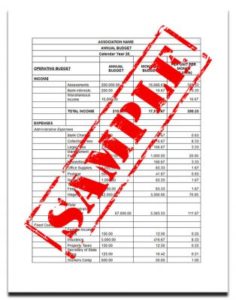HOA Budget Best Practices Every Board Member Should Know

Planning an HOA budget can be difficult work, especially if you've never done it before. With so many things to consider, it's easy to lose track of the details. Luckily, adopting these HOA budget best practices can ensure a smooth preparation.
Browse By Category
Sign up for Our Newsletter
Planning an HOA budget can be difficult work, especially if you’ve never done it before. With so many things to consider, it’s easy to lose track of the details. Luckily, adopting these HOA budget best practices can ensure a smooth preparation.
HOA Budget Best Practices to Live By
Creating an annual HOA budget is a critical aspect of managing any homeowners association. But, the laws surrounding the process are often poorly understood. This can lead to less-than-ideal practices, so we’re providing some HOA budget best practices for your board as you set your budget.
1. Know What the Budget Is For
What is the purpose of a budget for HOAs? Understanding HOA budgets and their purpose is one of the most critical best practices. An obvious reason is to facilitate smooth association management, but having a good budget can also preserve property values. The lack of a good budget can produce a domino effect that will ultimately end with reluctant lenders and fewer interested buyers.
When you know what your budget is for, you can anticipate the right expenses. For instance, if you’re budgeting for a special project, you must draft pro forma budgets.
If you’re planning the annual HOA budget, you must take everything into account. The annual budget sets the tone for the entire year and determines how much to charge homeowners in dues.
Some of the essential items you must include in your annual homeowners association budget are:
- Utilities (like water, electricity, gas, and the like)
- Insurance
- Maintenance needs
- Vendor services
- HOA management fees
- Reserve fund contributions
2. Make Conservative Projections
 The trick to HOA budgeting is to make conservative projections.
The trick to HOA budgeting is to make conservative projections.
Due to the unpredictable nature of most expenses, it’s nearly impossible to plan for expected costs down to the decimal point. Therefore, you should take a conservative approach when planning your HOA budget.
Some of the ways you can do this are by adopting these conservative HOA budget best practices:
- Anticipate income to purely come from dues.
- Project expenses with the current conditions of the economy in mind.
- Leftover operating funds should account for about 10 to 20 percent of your yearly dues.
3. Be Strategic
Apart from planning a 1-year budget, you should also create a 3- and 5-year financial plan. Determine any upcoming large projects your association may take on in the coming year and account for them.
Vendor services are a big part of your annual HOA budget, too. For this reason, it’s best to assess your contracts and send out requests for proposals ahead of time. This will help you allocate funds with better accuracy.
Make sure you’re getting the best deal and don’t be afraid to negotiate with your current or new vendors. The first estimate doesn’t have to be accepted if you think changes should be made.
4. Analyze Every Expense
When planning your budget, it’s always a good idea to look at every line item from past data. After all, this is how projections are made. Compare the actual expenses the association incurred in the last 3 to 5 years. This way, you can get a rough grasp of what your upcoming year will have in store in terms of costs.
Keep in mind, though, that you shouldn’t just rely on past data for your projections. A lot of outside factors can influence your budget. For instance, an increase in wages can significantly change how much vendors charge for their services. Make sure to marry the past with anticipations of the future, as well.
5. Prioritize the Community
A homeowners association should always put the community’s needs first, and the decisions you make for your budget should reflect that. Leave any personal or special interest at the door. By keeping the community in mind at all times, you can make better and more informed financial decisions.
6. Look for Ways to Reduce Expenses
A good way to reduce costs in the long-term is to have a professional conduct an annual onsite insurance evaluation of your association’s properties. Preventing problems is infinitely cheaper than remedying them, and anticipating what those problems are is the first step.
Additionally, your board should think about energy efficiency and water conservation. Swap out outdated equipment with more energy-efficient ones where you can. Sure, you’ll pay for the cost of replacement now, but this solution will help you save more money in the long term.
Giving owners ways to cut back in the new year will help everyone be more conscious, too. Send out emails or newsletters to the community with best practices for water usage, recycling, etc. This will not only cut down costs but can also be beneficial for the environment.
7. Account for Delinquencies
When you set HOA budgets, it’s important to keep in mind that not all homeowners might pay their dues on time or religiously. Some homeowners default on their payments. Make sure to account for delinquent homeowners when preparing your annual HOA budget.
If the number of delinquencies in your association accounts for more than 5 percent of yearly dues, then you should include a line item in your budget for bad debt. This way, you can offset some of the delinquencies and avoid ending up with a budget deficit.
8. Consider Your Reserve Fund
 Staying up-to-date on HOA reserve fund accounting is also important for understanding what will be needed in terms of future replacements and repairs for the community.
Staying up-to-date on HOA reserve fund accounting is also important for understanding what will be needed in terms of future replacements and repairs for the community.
In fact, some states even require reserve studies on a regular basis, such as California and Washington.
A reserve study will let you know how much money is currently in the reserve fund versus the estimated life remaining and overall condition in certain elements on the property. This way, you better know what to expect.
Without a reserve study, you risk running out of money for future replacements or capital improvements. As a result, your HOA will have no choice but to raise dues or charge special assessments, which no resident will want.
9. Obey the Rules
To avoid problems (and potential legal trouble), your HOA board should make sure it follows the association’s governing documents and all state laws religiously. Failure to abide by the proper procedures can result in unsavory consequences for both the board and the HOA itself.
For instance, while you can transfer money from your reserve fund to your operating fund on a temporary basis, you should think about what state laws apply. In California, you need to provide notice of intent to do so in a board meeting.
10. Be Transparent
Lastly, communicate regularly. Homeowners trust their HOA board to make and use budgets with the utmost integrity. It’s also easier to get budgets passed if you’re open and honest, getting the community involved in understanding the numbers and taking responsibility for their part. Plus, you might be able to get input or ideas board members hadn’t thought about yet!
The Difference Between Operating Budgets and Reserve Budgets
Homeowners associations need both an operating budget and a reserve budget to remain in good financial condition. And it is equally essential to have a separate bank account for each of these funds. But, how exactly do these two budgets differ?
Operating Budgets
An association’s operating budget or fund covers a period of 2 to 3 years. Its purpose is to cover the usual monthly expenses that HOAs incur. This includes items like landscaping, routine maintenance, and management fees. Dues and expenses are factors that can affect an association’s operating budget.
Typically, your operating budget should be managed from a checking account. This makes it easy to deposit and withdraw money on a regular basis. If you have an HOA manager, you can provide them with access to your operating fund to pay vendors and staff members.
Reserve Budgets
In contrast, an association’s reserve fund covers a period of 5 to 30 years. It is allocated to cover the cost of major replacements and repairs down the line. Examples of such costs include a street repaving project or roof replacements. Loans and special assessments are factors that can influence your reserves.
How much should an HOA keep in reserves? Having an accountant conduct a reserve study will let you know how much your reserve fund should contain. Generally speaking, though, it is a good idea to maintain a 70 percent funded reserve.
Because reserve budgets aren’t typically used on a regular basis, they are usually kept in a savings or interest-bearing account. If you have an HOA manager, it is best not to give them full access to your reserve fund. Instead, require board member signatures to make a withdrawal.
How Do I Make an HOA Budget?
Your governing documents should include a description of how the HOA budget is to be adopted every year. Most of the time, the budget will be adopted by either the HOA board or by vote from homeowners. And, in some instances, you might need both, especially if you’re needing to adopt a budget that includes an increase in dues that will largely affect homeowners and would require their vote.
It’s important to check your governing documents first before you plan HOA budgets. By doing so, you can ensure you’re following the proper guidelines set forth by the association. Failure to abide by the governing documents can result in legal consequences for the board and the HOA.
HOA Budget Template
Here is an example of the HOA annual budget that you can use as a guide:

Download Your HOA Annual Budget Template Here
HOA Budgets Serve a Purpose
Many HOA boards shudder at the very mention of HOA budget preparation, but it doesn’t have to be that way. Armed with these HOA budget best practices, enough time, and a willing effort, you can set your budget without running into problems. Remember that an HOA exists to serve its community. Without budgets, there would be no dues. And, without dues, an HOA can’t fulfill its duties.
It’s not a bad idea to ask for professional assistance when drafting your HOA budget, especially if your board has little experience in this field of management. Several HOA management companies offer their services on a full-time or remote basis. HOA managers have the necessary expertise and experience to handle budget preparation.
Look for the best HOA management companies near you with help from our online directory.
RELATED ARTICLES:
- HOA Budget Planning: A Guide To Doing It Right
- How The HOA Board Should Review HOA Finances Properly
- How To Calculate HOA Assessments
Trending Now
Related Article
Sign up for Our Monthly Newsletter
Sign up below for monthly updates on all HOA Resource
















